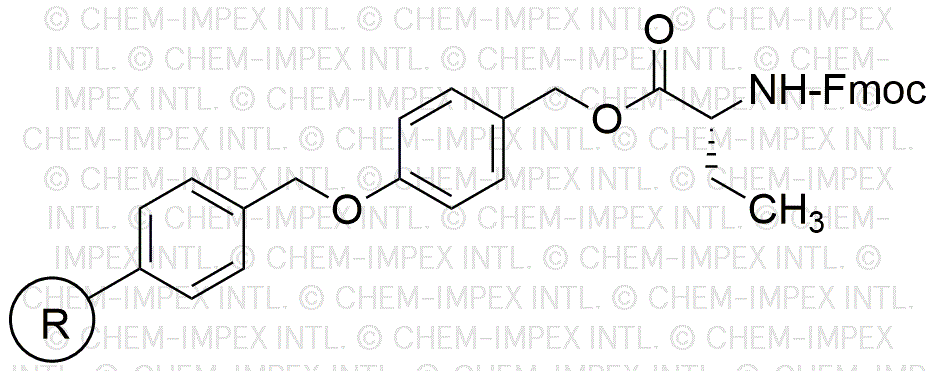Fmoc-2-aminobutyric acid 4-alkoxybenzyl alcohol resin is widely utilized in research focused on:
- Peptide Synthesis: This resin is essential for solid-phase peptide synthesis, allowing researchers to create complex peptides efficiently. Its stability and ease of use streamline the synthesis process.
- Drug Development: In pharmaceutical research, it serves as a key intermediate in developing peptide-based drugs, facilitating the creation of therapeutic agents with improved efficacy.
- Bioconjugation: The resin can be used to attach biomolecules, such as antibodies or enzymes, to peptides, enhancing the functionality of diagnostic and therapeutic products.
- Material Science: It finds applications in creating novel materials with specific properties, such as hydrophilicity or biocompatibility, which are crucial for biomedical applications.
- Research and Development: Its versatility makes it a valuable tool in academic and industrial labs for exploring new chemical reactions and developing innovative methodologies.
General Information
Properties
Safety and Regulations
Applications
Fmoc-2-aminobutyric acid 4-alkoxybenzyl alcohol resin is widely utilized in research focused on:
- Peptide Synthesis: This resin is essential for solid-phase peptide synthesis, allowing researchers to create complex peptides efficiently. Its stability and ease of use streamline the synthesis process.
- Drug Development: In pharmaceutical research, it serves as a key intermediate in developing peptide-based drugs, facilitating the creation of therapeutic agents with improved efficacy.
- Bioconjugation: The resin can be used to attach biomolecules, such as antibodies or enzymes, to peptides, enhancing the functionality of diagnostic and therapeutic products.
- Material Science: It finds applications in creating novel materials with specific properties, such as hydrophilicity or biocompatibility, which are crucial for biomedical applications.
- Research and Development: Its versatility makes it a valuable tool in academic and industrial labs for exploring new chemical reactions and developing innovative methodologies.
Documents
Safety Data Sheets (SDS)
The SDS provides comprehensive safety information on handling, storage, and disposal of the product.
Product Specification (PS)
The PS provides a comprehensive breakdown of the product’s properties, including chemical composition, physical state, purity, and storage requirements. It also details acceptable quality ranges and the product's intended applications.
Certificates of Analysis (COA)
Search for Certificates of Analysis (COA) by entering the products Lot Number. Lot and Batch Numbers can be found on a product’s label following the words ‘Lot’ or ‘Batch’.
Numéro de catalogue
Numéro de lot/série
Certificates Of Origin (COO)
This COO confirms the country where the product was manufactured, and also details the materials and components used in it and whether it is derived from natural, synthetic, or other specific sources. This certificate may be required for customs, trade, and regulatory compliance.
Numéro de catalogue
Numéro de lot/série
Safety Data Sheets (SDS)
The SDS provides comprehensive safety information on handling, storage, and disposal of the product.
DownloadProduct Specification (PS)
The PS provides a comprehensive breakdown of the product’s properties, including chemical composition, physical state, purity, and storage requirements. It also details acceptable quality ranges and the product's intended applications.
DownloadCertificates of Analysis (COA)
Search for Certificates of Analysis (COA) by entering the products Lot Number. Lot and Batch Numbers can be found on a product’s label following the words ‘Lot’ or ‘Batch’.
Numéro de catalogue
Numéro de lot/série
Certificates Of Origin (COO)
This COO confirms the country where the product was manufactured, and also details the materials and components used in it and whether it is derived from natural, synthetic, or other specific sources. This certificate may be required for customs, trade, and regulatory compliance.

